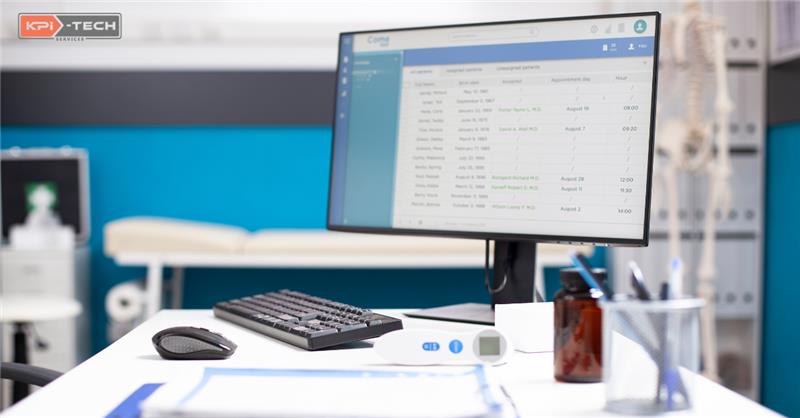Solving the Challenge of Multi-EHR Data Integration

Client Overview
The client is a leading provider of comprehensive cloud-based solutions designed to streamline operations for healthcare organizations. With a strong focus on electronic health records (EHR) and practice management, they empower healthcare providers to improve care delivery and optimize administrative workflows. With years of experience in healthcare and IT services, KPi-Tech provides high-level support to enhance their business, offering custom software development services that accelerate growth and improve operational efficiency.
Business Need
As the client expanded its reach across the healthcare market, many incoming provider organizations were using legacy EHR systems such as Allscripts, MD-Reports, Aprima, Greenway, and NextGen. Migrating clinical and administrative data from these disparate systems into the client’s proprietary platform was critical to ensuring continuity of care and operational readiness.
The client needed a robust, scalable solution to:
-
Extract structured and unstructured data from various EHRs.
-
Convert and normalize the data into a consistent format.
-
Accurately map the data to the client’s system schema.
-
Eliminate manual workflows to reduce errors and onboarding time.
KPi-Tech helped the client to design and implement an automated, repeatable data migration process.
Challenges
The migration project involved several complex data integration challenges:
-
Multiple EHR Systems: Data originated from a range of EHRs with varying database structures, formats, and export capabilities.
-
Inconsistent Data Formats: Data exports were received in HL7, CSV, XML, text, and SQL formats, requiring customized transformation workflows.
-
Manual Extraction Effort: Without a standardized interface, initial data extraction processes were manual, time-intensive, and prone to errors.
-
Complex Mapping Requirements: Accurately aligning and transforming legacy data fields to the new system’s schema required significant domain knowledge and validation.
Our Approach
KPi-Tech implemented a modular ETL solution using Talend Data Integration, tailored to handle various data ingestion scenarios and formats. Our team worked closely with the client’s technical and onboarding teams to ensure a seamless integration process, carefully mapping out the data journey to determine the most effective points for data manipulation, whether before or after ingestion, based on the client’s unique needs.
Highlights of the Solution:
-
Developed Talend Jobs to support two data intake models: Our team built a robust and adaptable ETL framework using Talend to support various intake methods based on the source system. We extracted structured clinical data directly from EHR databases such as Allscripts and MD-Reports. In cases where direct access wasn’t available, we processed exported files in formats like HL7, CSV, XML, and TXT. For systems offering modern interfaces, we integrated via REST APIs and FHIR endpoints to pull batch or real-time JSON data. Often, a hybrid approach was used, combining these methods based on the source system’s capabilities and constraints.
-
Designed reusable transformation workflows using Talend’s full range of data transformation models, including row-by-row, batch, lookup, and rule-based logic to convert and normalize diverse formats such as:
-
HL7 ➝ JSON
-
CSV ➝ JSON
-
Text/XML ➝ JSON
-
-
Data Normalization & Mapping: Incorporated field-level validation and mapping logic aligned with the destination system’s schema. Built reusable transformation logic to ensure accurate mapping of patient demographics, insurance data, appointments, orders, results, and clinical documents.
Built a modular architecture to support rapid onboarding of new data sources and clients.
-
Automation & Error Logging: Integrated comprehensive data logging and error-handling mechanisms within Talend jobs. This included job execution logs, row-level error tracking, and exception handling for malformed or incomplete records—ensuring transparency and simplifying troubleshooting.
-
Audit & Traceability: Established audit trails for every data load cycle, enabling validation and compliance monitoring.
Solution Architecture

Technology Stack
-
ETL Tool: Talend Data Integration
-
Data Sources: Allscripts, MD-Reports, Aprima, Greenway, NextGen
-
Data Formats: HL7, CSV, XML, TXT, JSON
-
Target System: Proprietary Healthcare Platform
-
Environment: On-Premise & Cloud-Compatible Deployment
-
Database: PostgreSQL (for staging and transformation)
Results & Impact
-
Reduced Migration Time: Automation shortened the overall migration timeline by over 50% compared to manual processes.
-
Operational Efficiency: Minimized manual work and reduced dependency on technical staff for repetitive tasks.
-
Improved Data Quality: Robust transformation logic and validation improved accuracy and consistency of clinical data.
-
Scalability: The modular solution could be replicated for new clients with minimal rework.
Ready to Automate Your Clinical Data Abstraction and Integration?
Partner with KPi-Tech to reduce manual workloads and accelerate EHR transitions through intelligent data handling.





